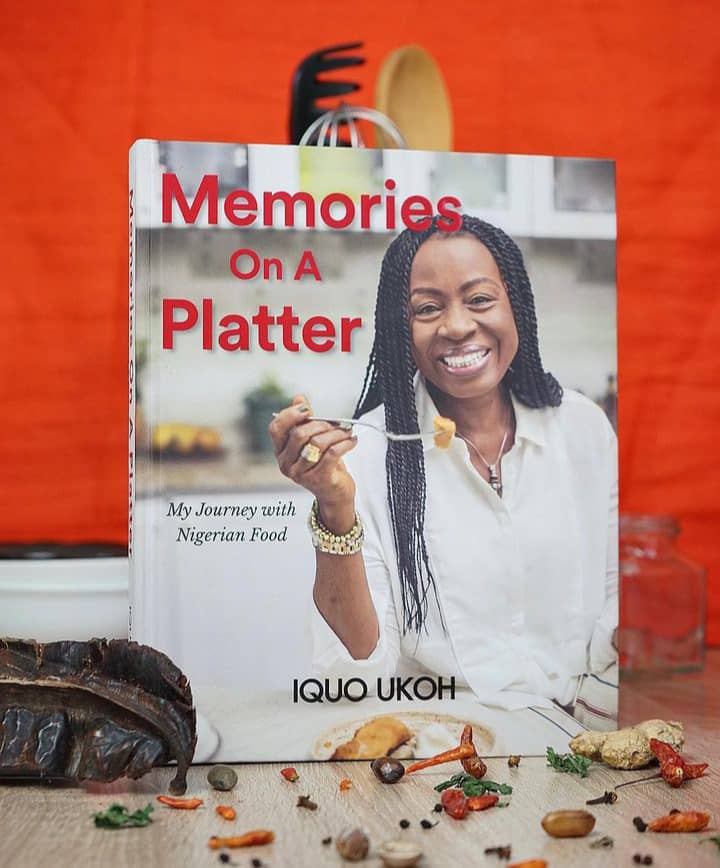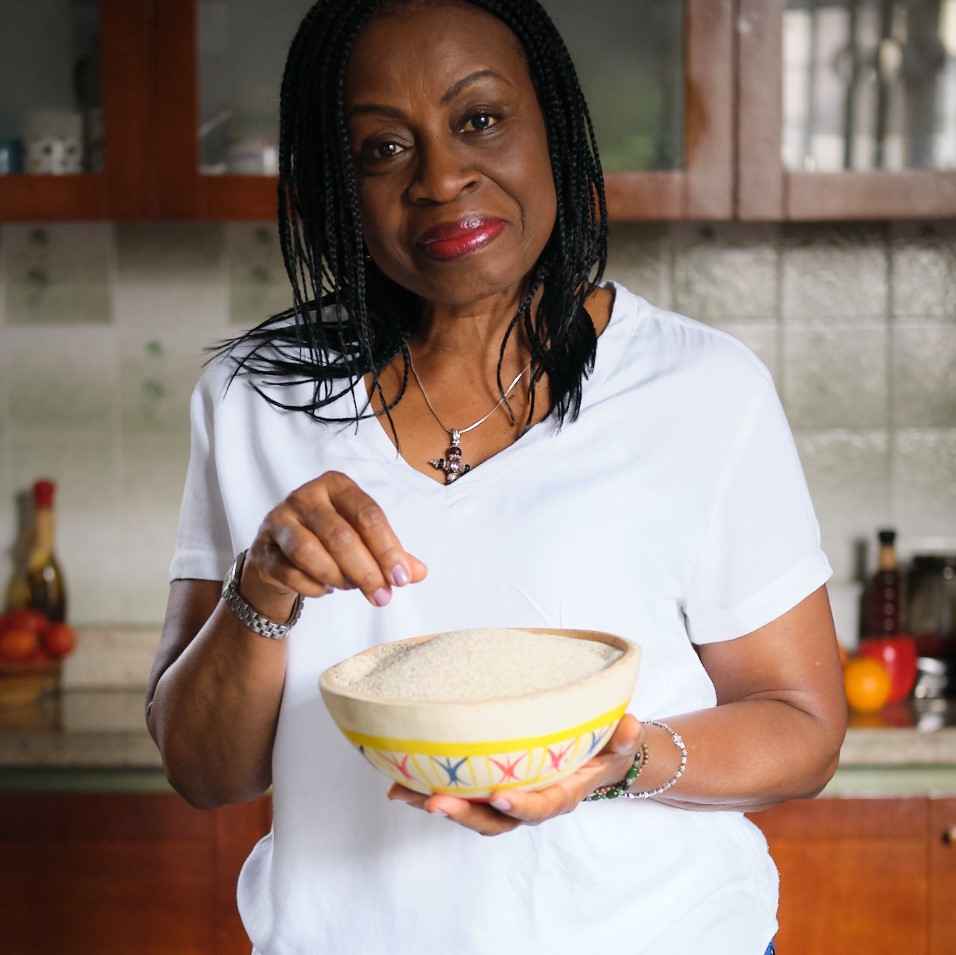
As Women’s History Month draws to a close, it’s important to acknowledge the emotional significance it holds for us. Nonetheless, we’re thrilled by the success of our annual Glazia Women’s History Month Spotlight Campaign, where we’ve had the privilege to highlight several remarkable women. From Michelin-Star Chef Adejoké Bakare to DEI Expert Dr. Palesa Munzara, Image Consultant Olere Odior, Events Experience Guru, Tobi Olanihun and many others, it’s been a journey filled with impact and empowerment. As we conclude the 2024 Glazia WHM Spotlight Campaign, our focus now shifts to celebrating the achievements of renowned culinary expert and author, Iquo Ukoh.
Iquo Ukoh is the founder of the 1Q Food Platter blog and the author of the recently released book “Memories on a Platter: My Journey with Nigerian Food,”. She is introducing Naija flavour to the cultural food scene. Her culinary journey began in 2013, and she established her blog to showcase West African cuisine to a global audience. Her primary goal is to assist Nigerian Americans in reconnecting with their heritage through food.
For Iquo Ukoh, her cookbook serves to preserve the Nigerian identity through culinary traditions. She firmly believes that documenting our foods, recipes, and the stories behind them offers insight into our relationship with these dishes.
For approximately three decades, Iquo Ukoh has worked with one of the largest multinational food companies globally. Throughout more than half of this tenure, she dedicated her efforts to crafting recipes tailored for Nigerian women. With an in-depth understanding of these women, their families, kitchens, and potential food-related health challenges, she is well-equipped to address their culinary needs.
“I am convinced that as Nigerians we must narrate our rich and varied culinary stories to the world on our terms.”
Iquo Ukoh
Glazia in conversation with Iquo Ukoh
Can you share the inspiration behind starting the 1Q Food Platter blog and writing your recent book, “Memories on a Platter: My Journey with Nigerian Food”?
In 2013, I embarked on my food blogging journey, joining the Nigerian Food Bloggers community established around 2007. Inspired by the diverse topics discussed, I aimed to bring a unique perspective to this dynamic ecosystem.
My mission was to highlight traditional Nigerian cuisine, elevating its status while emphasizing its nutritional benefits. Blogging became my platform for documenting culinary explorations and promoting preventive health practices.

As a nutritionist and dietitian, I integrated healthier dishes and eating habit tips into my blog posts. I also advocate for informed dietary choices to lower disease risks, particularly in Nigeria, where misinformation is prevalent.
Growing up with my father’s job relocations and my extensive travel across Nigeria, I gained a deep understanding of our diverse culinary culture. Leveraging this knowledge, I crafted recipes that bridge cultural divides within the country.
Driven by the ambition to showcase Nigerian cuisine globally, I meticulously styled and photographed dishes to captivate audiences. Through recipe innovation and food photography, I created a space for cultural expression and gastronomic discovery.
This journey culminated in the publication of my book — “Memories On A Platter – My Journey with Nigerian Food,”. Reflecting my dedication to celebrating and sharing Nigerian culinary heritage with the world.
What motivated you to focus specifically on showcasing West African cuisine globally, and how do you believe your platform has impacted the perception of Nigerian food on the international stage?
Food is a strong element of any culture. Nigerian food is yet to have global prominence. Part of my vision for Memories On A Platter is to help preserve the Nigerian Identity. I believe that as the story of Nigerian music, movies, and fashion continues to gain global prominence and recognition, so will our foods. The first step is the documentation. The next step of course is to provide opportunities for tasting the foods. Through the documentation of our culinary techniques, regional delicacies, and diverse and rich flavors, I can tell the authentic Nigerian food story. There is also the need to find avenues to increase accessibility to our foods through pop-ups, professionally run, full-service restaurants, and improve the availability of indigenous ingredients
In your culinary journey since 2013, what have been some of the most rewarding moments or achievements that you are proud of?
“Memories On A Platter”- My Journey with Nigerian Foods, my cookbook, serves as my contribution to preserving the Nigerian identity through the lens of food. I hold the conviction that by physically documenting our dishes, their recipes, and the stories behind the foods, we offer a glimpse into our collective relationship with these foods. Such a meticulously crafted cookbook transforms into a treasure passed down through generations, potentially sparking a love for cooking among its readers.
The goal of capturing the essence of Nigerian cuisine and its preparation methods is to empower my audience to prepare and savour these meals with loved ones. It is incredibly fulfilling to meet followers, both online and in person, who share their successes in cooking traditional dishes like Afang soup or Asaro (yam pottage) using my easy-to-follow recipes. Engaging in collaborative culinary dialogues with restaurant owners and food aficionados both within Nigeria and globally further fuels my passion and dedication to the culinary world.

Your mission includes helping Nigerian Americans connect with their cultural roots through food. Can you share some strategies or initiatives you have implemented to achieve this goal?
Observing Africa and Nigeria in particular, I notice a scarcity of literature capturing the vast and vibrant culinary heritage we possess and yearn to share globally. While significant progress has been made in promoting our cuisine through social media by food bloggers and at a few professionally run restaurants by chefs, I believe there is still a considerable gap in documentation and discussion. It is time for us to “Soro Soke” – speak louder and make our voices heard even more. My passion lies in chronicling Nigerian cuisine as a means to safeguard our cultural identity. I am convinced that as Nigerians we must narrate our rich and varied culinary stories to the world on our terms.
“Memories On A Platter – My Journey with Nigerian Foods” was introduced in Canada last year, marking a significant step in this journey. I have made an effort to share straightforward Nigerian recipes on my YouTube channel, which can be easily prepared with ingredients available in America. Furthermore, the presence of my book on Amazon enhances its accessibility to an American audience, ensuring that the richness of Nigerian cuisine artistry can be explored and appreciated everywhere.
As a woman entrepreneur in the culinary industry, what challenges have you faced, and how have you overcome them?
The infrastructural deficit in the operating environment in Nigeria affects all businesses in the industry. Poor Internet connectivity and insufficient electricity continue to pose a big challenge in operating online businesses. Navigating these bottlenecks with self-generated solutions has meant a higher cost of operations.
Could you highlight the importance of cultural representation in the culinary space, and how do you ensure authenticity in your recipes and presentations?
With over 300 ethnic groups, Nigeria is a country of diverse cultures and cultural nuances. My extensive travels, observing, interactions, and understanding of the cooking and eating habits in different cultures have helped to ensure the inclusion of many of the diversities in my work. It is a conscious effort to ensure representation of all the regional cuisines. I hope that within Nigeria we explore dishes that are not specific to our ethnic origin. With over 130 recipes in my book, I have ensured that there is ample representation of cuisines across the regions.

What advice would you offer to aspiring food bloggers or authors who are passionate about sharing their cultural cuisine with a global audience?
Researching, authenticating, and standardizing recipes indeed requires significant time and effort, yet these processes are critical to maintaining the authenticity of the information we present globally. A notable challenge in documenting Nigerian cuisine is that many of our foods and ingredients lack English equivalents. Consequently, preserving their local names becomes an essential aspect of cultural preservation. Offering a glimpse into our rich heritage and tradition.
It may be practical to prioritize certain dishes, like Jollof rice, that are more accessible in terms of ingredients availability for an international audience. This strategic approach can stimulate interest and experimentation with Nigerian cuisine, encouraging people from different cultural backgrounds to explore and appreciate our culinary diversity. By thoughtfully selecting dishes that minimize the barrier to entry, we can foster a global appreciation for Nigerian food, inviting more people to experience the flavors and stories that make our cuisine uniquely captivating
Looking ahead, what are your aspirations and goals for the future of the 1Q Food Platter blog and your culinary endeavors?
My experience with Nigerian cuisine underscores the considerable effort required to elevate our culinary tradition onto the global stage. Within Nigeria, there’s a growing movement towards creatively utilizing local ingredients, suggesting a natural progression towards exporting new Nigerian dishes. This trend is complemented by a rising appreciation for Nigerian food worldwide, fueled in part by a surge in the number of Nigerians relocating abroad, a trend colloquially referred to as “Japa” and the improved accessibility of Nigerian ingredients in international markets due to advancements in supply chains.
Amidst these developments, 1Q Food Platter is poised to play a significant role by offering cooking solutions that encourage the consumption of Nigerian dishes both domestically and internationally. My vision is that regardless of our geographical location, we can all partake in preparing, savoring, and sharing the essence of Nigeria with the rest of the world. In doing so, we foster a global community united by a shared love and appreciation for Nigerian cuisine.
Promoting Nigerian food worldwide and preserving Nigerian culture through its cuisine is my heartfelt passion. I envision future generations continuing the documentation process, as cultures evolve. Consistent documentation from one generation to the next is vital for ensuring this preservation.
Lastly, how do you believe your work contributes to celebrating and preserving African culinary heritage for future generations?
With “Memories On A Platter- My Journey with Nigerian Food”, I take pride in being able, to sum up our food narrative in a single book. Especially considering our belated entry into the global culinary scene. The array of textures, hues, and intricate flavors present in a dish of Nigerian cuisine mirrors the rich tapestry of cultures, ethnicities, and languages that characterize our people. This culinary diversity is akin to the patterns of our Ankara fabrics, the lively conversations that fill our streets, the pulsating rhythms of our music, and fundamentally, our food. It all culminates into a vibrant expression of the essence and spirit of Naija, a heartfelt tribute to the passionate way we live and share our cultural heritage with the world.

